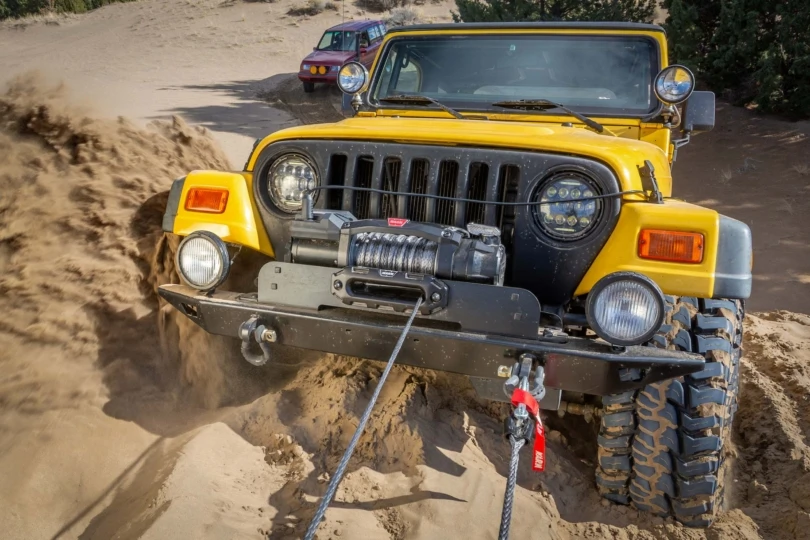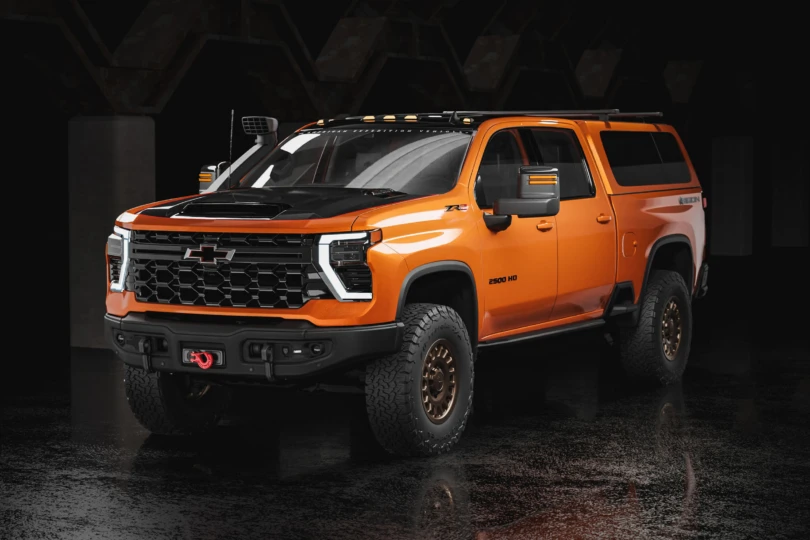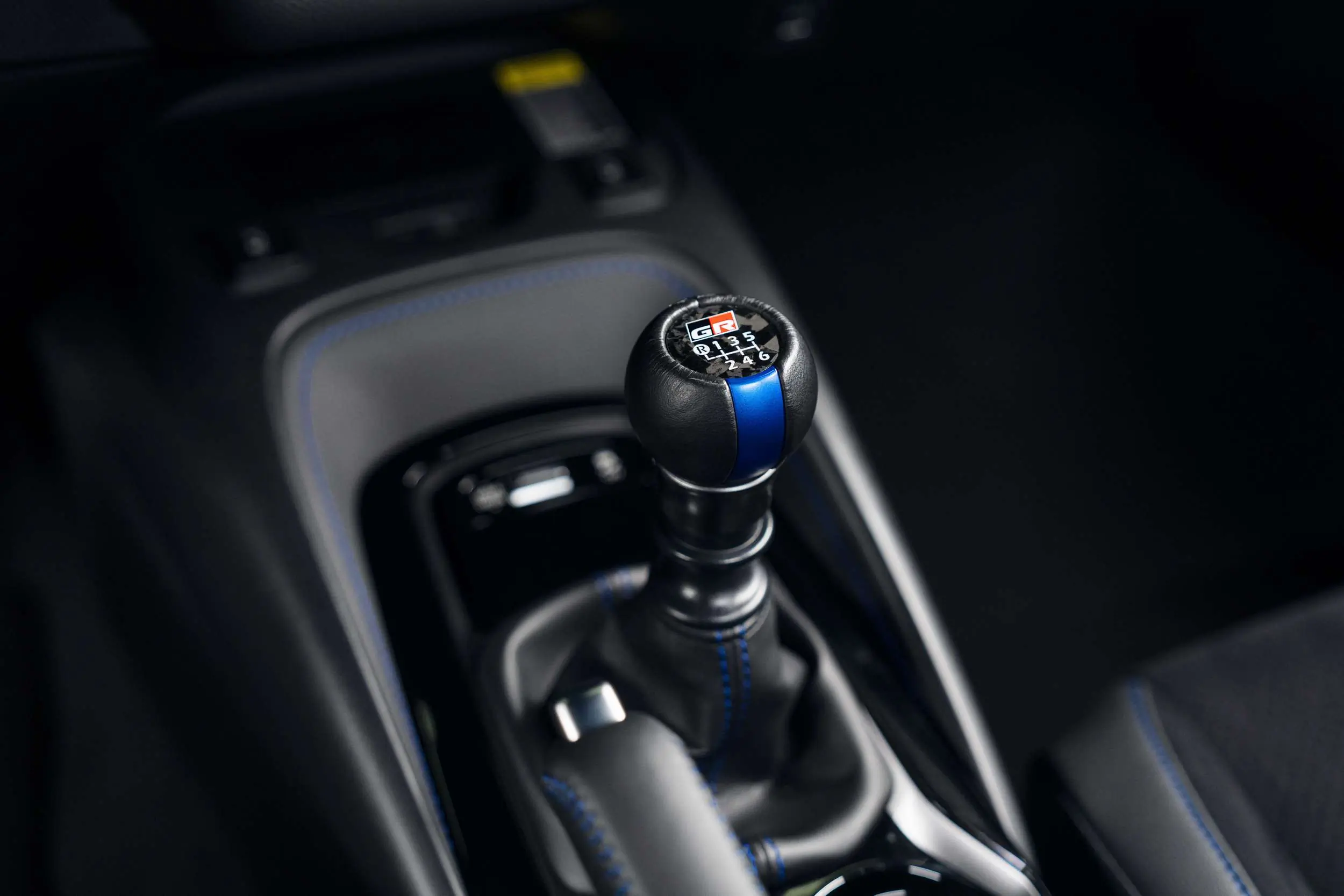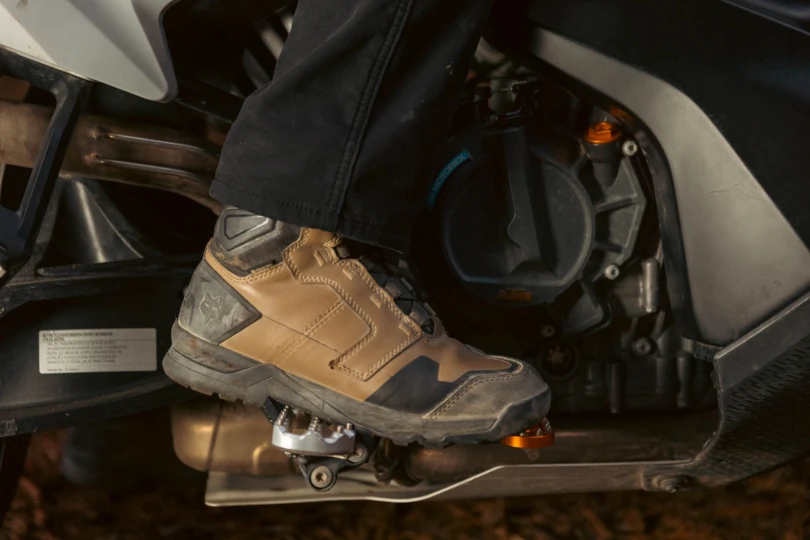In December, Polaris announced the first full-power, full-capability, go-anywhere, haul-everything electric UTV. We finally got to take one for a test drive at Polaris’ headquarters in Wyoming, Minnesota.
After a couple of hours hammering the Ranger XP Kinetic on Polaris’ test track, we can confirm that the XP Kinetic delivered on everything Polaris promised, from precision and control to more hauling capability than its gas-powered cousin, to zero maintenance.
The electric drivetrain is nearly silent, so you can have a conversation with a person in the passenger seat. And if you’re using the Kinetic XP to hunt, you won’t scare away the game.
Polaris 2023 Ranger XP Kinetic UTV: Review

Familiar Ranger UTV
When Polaris announced the XP Kinetic, we knew it would be good. After all, the brand signed a 10-year partnership with Zero Motorcycles in 2020 to bring electric powersports vehicles to market.
Polaris is calling the XP Kinetic “the world’s most capable, most durable, highest performing UTV available.” And we can’t argue with that statement.

Polaris entered the electric UTV category boldly with a reimagined version of the top-selling power sports utility vehicle in the United States, a vehicle that Polaris has been making since 1999.
The Ranger XP Kinetic has the same clearance as the gas-powered Ranger, and the same seats, wheels, tires, and many of the same accessories. The brand says that 95% of Ranger accessories are compatible with the Ranger XP Kinetic.
A Different Kind of Ranger

Turn the key on the XP Kinetic, and the console flashes on silently while the command center boots up. A stick gearshift lets you shift the Kinetic from park to low, high, and neutral. A switch on the shaft of the gearshift puts the Kinetic into reverse.
The Kinetic has the same clearance as the standard Ranger, though the suspension is tuned to accommodate the weight distribution of a vehicle without a motor in the front and with most of the weight in the battery bank behind the driver’s seat.
While clearance is the same, the center of gravity in the Kinetic is lower than in the gas-powered Ranger, giving this UTV even more confident handling.

The console shares standard info like how fast you’re going — the Kinetic’s top speed is around 60 mph. The display also shows the percentage charge, expected range, and the temperature of various systems as well as how much regenerative power you’re creating. There are 20-30 possible metrics you can display on the screen. Polaris lets you customize.

A 12V connector in back lets farmers and ranchers plug in instead of fishing a cable. Lift the manual dump bed, and there’s not a lot there. Electric vehicles don’t need oil changes or air filters, and there isn’t a clutch or belt.
The Kinetic has a 1,250-pound hauling capacity versus the gas-powered Ranger’s 1,000-pound capacity.

Like the Ranger, the Kinetic has a huge bumper for protection. A winch comes standard, and the unit has a connection for a plow.
One of the connectors, which looks like a handle, is cleverly positioned to protect the winch cable from being damaged when lowering and raising the plow, or when winching — an issue we’ve had with other UTVs we’ve plowed with.

The distinctive front end is radiator-free. LED headlights light the trail, and a futuristic light bar across the hood indicates the vehicle’s level of charge. When that light bar is fully illuminated, the vehicle has 100% juice.
As the vehicle charges, the light fills in from one side to the other. Point the vehicle toward your house while you’re charging, and you can see if your XP Kinetic is powered up and ready for work or adventures.

Instead of filling a gas tank, to “refuel” the XP kinetic, you plug it into a standard 110V wall outlet or into a Level 2 charger. Polaris works with Qmerit to facilitate in-home installation of Level 2 chargers.
In some states, those chargers are free with the purchase of an electric vehicle. And if you already have an EV, the charger will be compatible, though you may need an adapter.
There are a few XP Kinetic-specific accessories, including a new front camera for plowing and an electric heating system.
Electric Polaris Ranger Drive

Chris Judson, Polaris’ VP of ORD Utility, noted, “When we built the Kinetic, our mission was to build the best Ranger we ever built, one that’s tons of fun to ride, with more cargo capacity, that lets people work efficiently and have fun while they’re working, so can get to other things on the schedule.”
The XP Kinetic’s specs have been out since December, but we were one of the first three people to drive this UTV outside of Polaris’ staff.

Press the accelerator and the machine whirrs to life. The accelerator gave me unprecedented control when driving. I could inch forward and backward. There was nothing jerky in the vehicle motion, just smooth cruising.

The unit has high and low gear and three power modes. Low gear was exceptionally powerful and pleasant to drive in on more technical terrain. It’s a significantly faster low gear than I’ve experienced in any other UTV. That’s not shocking considering this vehicle has 140 foot-pounds of torque versus 60 foot-pounds in a gas-powered vehicle.
High gear was even faster. Three drive modes — one-wheel, two-wheel, and four-wheel — let me choose how I engaged the tires. One-wheel mode had minimum impact driving on a grassy lawn, while four-wheel had all the traction I expected, and two was a nice middle ground.
Three drive modes let me manage battery life. Eco+ optimizes torque and top speed for maximum range and light-duty jobs. Standard optimizes throttle response for everyday driving and moderate-sized jobs. Sport optimizes throttle response for spirited driving and the toughest jobs.
In Eco+, I could squeak out more miles thanks to additional regenerative power and slightly muted throttle engagement while Standard and Sport provide more speed, power, and response.

Polaris talks about the validation cycle that all its vehicles go through. And this one clearly passed with flying colors.
Creeping over rocks with control, traction, and power was an amazing operation. The only sound was the purr of the electric drive and the crunch of tires on rocks. The Kinetic climbed steep hills with confidence and agility.
That’s a scenario where more lawn- and garden-focused electric UTVs have failed me.
What We Don’t Know
I didn’t get to drive the Kinetic in slow technical terrain, and I didn’t get to drive it loaded, which will be very telling. Because there’s no combustion engine, sounds you’ve likely never heard in a UTV, like the whir of a cooling fan and various squeaks as the UTV navigates uneven terrain, are obvious. Neither Ranger build has air conditioning.
Power-drawing accessories are mostly powered by an onboard 12V battery, as they are in the gas Ranger. And forget heated seats. Though that’s how many electric cars recommend drivers warm the cockpit, the XP Ranger doesn’t offer that option.
I also didn’t get to see how the Ranger performs in cold weather. Every Kinetic has heated battery packs to keep the system primed for operation. Once the XP Kinetic is moving, heat from operation keeps the batteries at the ideal temperature, even in extremely cold temperatures.
In Short
“Our emphasis on innovation is constant,” said Mike Donoughe, Polaris Senior Vice President, Chief Technical Officer, and Head of Electrification. “This is a continuation of our commitment to innovation which is the passion of this company.”

That doesn’t mean Polaris will be discontinuing the gas-powered Ranger any time soon … unless that’s what customers ask for. But Donoughe says that Polaris will “keep pushing with innovations that set us apart.”
Polaris says that its vision for the future is customer-driven. “We continue to ask ourselves what does the consumer want?” said Chris Heard, Polaris’ Product Planning Director for Utility.
“Did they want an iPad that takes phone calls or an iPhone? We started with our best-selling Utility Vehicle, and we unlocked new capabilities and we continue to focus on watching our customers interact with products like the XP Kinetic. Customers can’t always articulate what they want, but we glean a lot of insights from observing.”
So far, we’re super impressed.
Ranger Kinetic Specs
The Ranger Kinetic is available in two trims.
The Premium model has one 15kWh battery and around 40 miles of range. The Ultimate model has two batteries, 30kWh of battery, and around 80 miles of range. And it has Polaris’ Ride Command navigation and communication system, which in the XP Kinetic displays advanced diagnostics.
The base model cannot be upgraded with an additional battery. But charging speeds can be boosted with a 3kWh charger. The vehicle takes around 19 hours to charge plugged into a 110V wall outlet, and 3-5 hours plugged into a Level 2 charger depending on if you’re charging the one-battery or two-battery model.
Pricing starts at $26,699, and you can check it out at the Polaris website.
Polaris 2023 Ranger XP Kinetic UTV: Details
General Information:
- Manufacturer: Polaris
- Model year: 2023
- Model: Ranger XP Kinetic Premium
- Model code: R23E3CC2BD
- Color: Icy White Pearl
Brakes:
- Front/Rear: 4-Wheel hydraulic disc with dual-bore front calipers
- Engine Braking System (EBS): Regenerative braking
- Parking: Park In-Transmission
Wheels:
- Aluminum: 14 in. (35.6 cm)
Tires:
- Front: 29 x 9-14, Pro Armor X-Terrain
- Rear: 29 x 11-14, Pro Armor X-Terrain
- Ply rating: 8 ply rated
Dimensions:
- Length: Overall – 120 in. (305 cm)
- Height: Overall – 78 in. (198 cm) / Water Fording – Equal to the floorboards
- Width: Overall – 65 in. (158 cm)
- Weight: Dry – 1,730 lb. (785 kg) *Preproduction estimates and final vehicle weights may vary slightly
- Ground clearance: 14 in. (35.6 cm)
- Wheelbase: 81 in. (206 cm)
- Turning radius: 13.3 ft.
Drivetrain:
- Transmission: Gates Synchronous Belt H/L/N P (Electronic Forward/Reverse)
- Drive system: High-Performance On-Demand True AWD/2WD/VersaTrac Turf Mode
- Final drive: Shaft
Electrical:
- Battery: Lithium-Ion, 14.9 kWh Nominal
- Instrumentation: Driver’s Side Dual-sweep Analog Dials with 4 in. Multi-Color LCD Rider Information Center: User Selectable Backlighting & Brightness, Programmable Service Intervals, Speedometer, Power Use %, Battery Regen %, Odometer, Tripmeter, Clock, Gear Indicator, Battery State of Charge %, Range Remaining, Charging Rate, Battery Temperature, Motor Temperature, Accessory Battery Voltage, Service Indicator and Codes, Seat Belt Reminder
- Lighting: Dual LED Headlamps, 1,250 lm low beam, 2,300 lm high beam, LED Front Accent with Charge Indicator, Dual LED Taillamps
- Advanced electronics: Connectivity with RIDE COMMAND+ via the Polaris app
- Electrical system: Polaris Pulse (6-position)
- Charger type: Onboard Battery Charger – 3 kW
Engine:
- Cooling: Active air and liquid
- Horsepower: 110
- Torque: 140 lb.-ft.
- Motor type: Internal Permanent Magnet AC Motor
Operational:
- Front suspension: Dual A-Arm / Travel – 10 in. (25.4 cm)
- Rear suspension: Dual A-Arm, IRS / Travel – 10 in. (25.4 cm)
Steering:
- Electronic power: Standard
- Tilt: Standard
- Premium Wheel and Interior Accents
Seating:
- Three-person capacity
- Adjustable driver seat: Standard
- Premium Cut & Sew Seats with Contoured Seatbacks and Embroidered Polaris Branding
Other:
Includes:
- Charging Kit Included (EVSE): J1772
- Combined Level-1 / Level-2 Mobile
- 12V Cargo Box Power Port with integrated dash switch
- One DC Outlet
- Dual USB Port
- Cargo Box Located 12V SAE Port with In-Dash On/Off Switch
Other Specs:
- Cargo box length: 36.75 in. (93.3 cm)
- Cargo box height: 12.5 in. (31.75 cm)
- Cargo box width: 54.25 in. (137.8 cm)
- Cargo box: System – Lock & Ride
- Capacity: Payload – 1,500 lb. (680.4 kg) | Rear Rack – 1,250 lb. (567 kg)
- Towing capacity: 2,500 lb. (1,133.9 kg)
- Hitch: Standard 2 in. (5.08 cm) receiver
- Safety features: Full-Coverage Front Bumper with integrated winch and plow mounts | Full-Body Skid Plate







